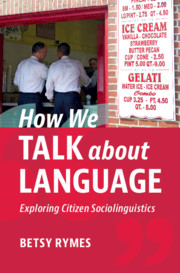Book contents
- How We Talk about Language
- How We Talk about Language
- Copyright page
- Contents
- Figures
- Tables
- Preface
- Introduction
- 1 Citizen’s Arrest!
- 2 Wonderment
- 3 Doing Citizen Sociolinguistics
- 4 Fomenting Wonderment and Critique
- 5 Citizen Sociolinguistics and Narrative
- 6 Acts of Citizen Sociolinguistics
- Conclusion
- References
- Index
Conclusion
Why We Must Talk about Language
Published online by Cambridge University Press: 07 September 2020
- How We Talk about Language
- How We Talk about Language
- Copyright page
- Contents
- Figures
- Tables
- Preface
- Introduction
- 1 Citizen’s Arrest!
- 2 Wonderment
- 3 Doing Citizen Sociolinguistics
- 4 Fomenting Wonderment and Critique
- 5 Citizen Sociolinguistics and Narrative
- 6 Acts of Citizen Sociolinguistics
- Conclusion
- References
- Index
Summary
This chapter concludes the book with a call for language awareness for all: a roundup of approaches to exploring how we talk about language and an explanation for why we must. Any student, from pre-school through graduate school, and any human, of any age, can embark on this type of citizen sociolinguistic inquiry. This chapter calls readers to listen to their students, colleagues, children, and peers: What word, turn-of-phrase, or way of speaking has led to wonderment and sparked conversation? Hoagie? Lightening bug? Creaky voice? Eyebrows on fleek? Chinese? What sorts of citizen sociolinguistic arrests have you (or people you know) experienced? These experiences – good and bad – can be springboards to important citizen sociolinguistic inquiry. Over the years, I’ve developed the ideas in this book as a loose guide to push high-school, college and graduate students, and myself to explore language questions – whether sparked by wonderment, arrest, or something else, and to dwell with multiple possible answers to any of them. I provide examples of my own and encourage readers to build flexible and thoughtful habits with language, as citizen sociolinguists, and to share their discoveries through more acts of citizen sociolinguistics.
Keywords
- Type
- Chapter
- Information
- How We Talk about LanguageExploring Citizen Sociolinguistics, pp. 185 - 192Publisher: Cambridge University PressPrint publication year: 2020



